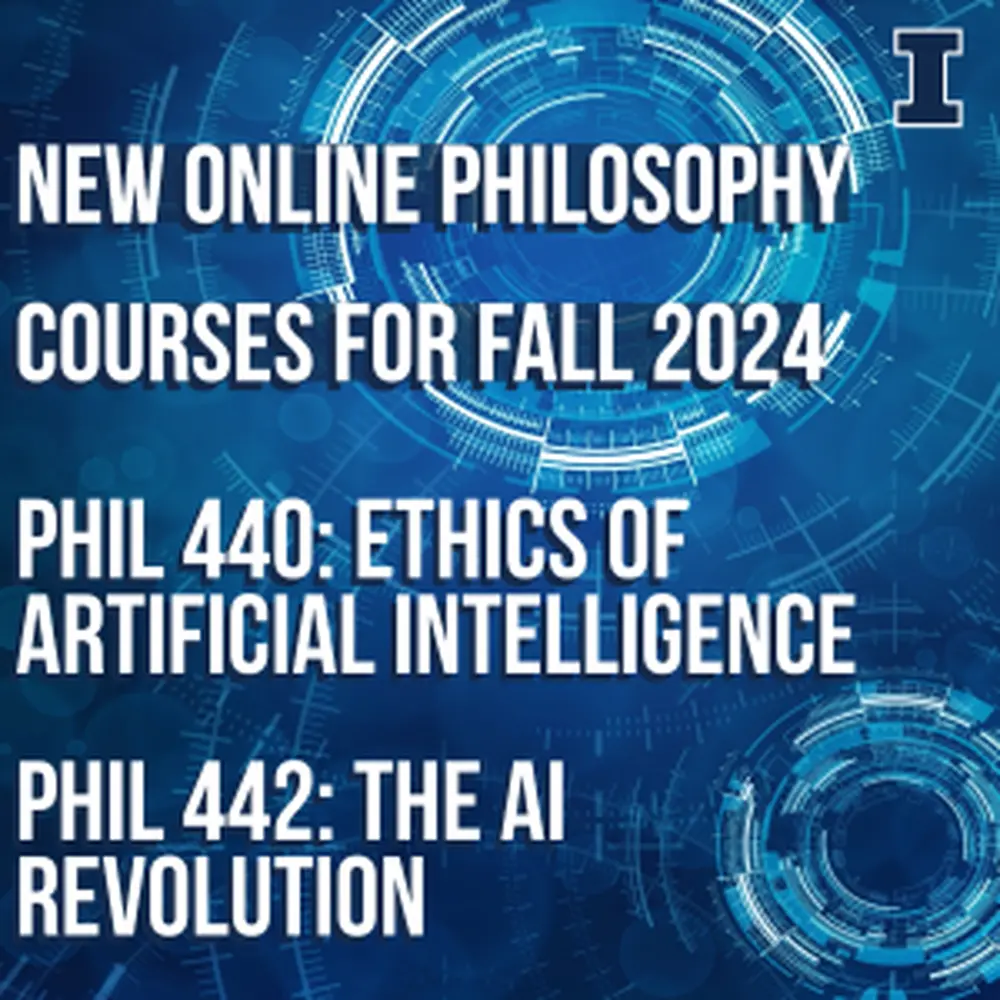
The Department of Philosophy is pleased to announce that we’ve added two new online courses on artificial intelligence in the fall semester: PHIL 440: Ethics of Artificial Intelligence and PHIL 442: The AI Revolution. Both courses meet in the second half of the fall semester (October 21-December 11, 2024).
PHIL 440: Ethics of Artificial Intelligence
The development of Artificial Intelligence (AI) has generated a range of ethical challenges. This course provides students with an understanding of these challenges along with thinking about how best to respond to them. Students will explore the evolving relationship between AI and employment, including both the ethical considerations raised by job displacement and the changing nature of work. Other topics include the pervasive issue of bias in AI algorithms, ethical implications of data collection and surveillance, and the moral status of AI systems. Students will learn about a broader range of risks that AI can pose to human values, especially when algorithms are poorly aligned with human values. The course also considers existential risk: how should we think about the possibility of AI bringing about the end of humanity?
PHIL 442: The AI Revolution
We are in the midst of what many have called an “Artificial Intelligence (AI) Revolution.” This revolution is comparable in scope and impact to other major transformations in human history—like the industrial revolution, the agricultural revolution, and the axial revolution). The AI revolution has begun to bring about profound changes in how we understand ourselves and function in the world. It is impossible to understand this what is happening during this fundamental transformation in human life without a close examination of the nature of human minds, the nature of computation and artificial intelligence, and the complex and rapidly evolving relationships between them. With this background understanding in mind, students will be able to understand better just how and why recent developments in AI have begun to challenge a host of traditional concepts and ways of thinking, while presenting a variety of novel and pressing ethical, social, interpretive, conceptual, technological, and existential questions. The purpose of this course is to provide students with that background and understanding. To that end, section one—Human Minds—delves into the essence of human thought, feeling, consciousness, and morality. Section two—Artificial Minds—focuses on the historical development of AI, in its different computational forms, and offers critical discussions of AI’s ability to replicate human mental processes. Section three—The AI Revolution—then builds on these discussions to examine the transformative effects of AI on society in a broad range of spheres, ranging from AI authorship to deep fakes, deception, algorithmic bias, the replacement of human labor and expertise, and the future shape of a new and emerging human condition. Through this layered process, which builds in stages, students will develop the nuanced and rigorous understandings of AI needed to function thoughtfully and lead in an era where AI is becoming not just a tool to some ends but also a fundamental component of strategic innovation and decision-making, with both novel opportunities and risks, in many sectors of human life. Designed to foster a critical understanding of AI’s capabilities and limitations, this course seeks to equip students with the knowledge needed to navigate and shape the future of AI in their respective industries. Through a combination of expert-led presentations, interactive discussions, and case studies, participants will emerge with a forward-looking perspective on AI as a pivotal force in the modern world while understanding and knowing how to mitigate its risks.